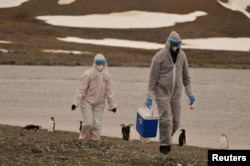Following recent outbreaks of avian influenza in cows and goats in the United States, the World Health Organization has called on governments to step up surveillance and “remain vigilant” about the potential spread of the deadly disease to their countries.
Dr. Zhang Wenqing, head of the World Health Organization’s global influenza program, said on Friday that the scope and severity of H5N1 avian influenza found in 29 pig herds in eight states in the United States since March is under investigation.
“While WHO and partners are closely monitoring, reviewing, assessing and updating the risks associated with H5N1 and other avian influenza viruses, we call on countries to remain vigilant, report human infections quickly, share sequence and other data quickly, and Strengthen biosecurity measures in animal farms,” Zhang said.
Zhang also told reporters in Geneva that a laboratory-confirmed case of bird flu was discovered on April 1 in a man working on a dairy farm in Texas.
“The case in Texas is the first case of a human contracting avian influenza from a cow,” she said, noting that he likely became infected “through direct contact with cows.”
“We are now seeing more and more states across the U.S. with herds of infected cows, suggesting further spread of the virus to mammals,” she added. She warned that “farm workers and others in close contact with cows should take Precautions in case animals are infected.”
Zhang also pointed out that so far, the virus has not been found to be transmitted from cattle to other mammals, although transmission between birds and cattle, cattle and cattle, and cattle and birds has occurred during the current epidemic.
“While a lot of things are still under investigation, this suggests that the virus may have found… different routes of transmission than we previously understood,” she said. “While this sounds concerning, it also demonstrates strong disease surveillance that allows us to detect the virus.”
Avian influenza A (H5N1) first appeared in 1996. In 2020, the virus spread to Africa, Asia, and Europe before entering North and South America in 2022.
“In recent years, we have seen the virus spread to mammals,” Zhang said, noting that the USDA has found infections in “about 200 mammals.”
Human infection with avian influenza is rare and is associated with exposure to infected animals and the environment. The World Health Organization reports that nearly 900 cases have been detected since 2003. About half of those infected with the disease have reportedly died.
In the early years, most cases were found in Asia and Southeast Asia. The WHO reports that relatively few and mild cases have been reported to the agency in the United States and Europe over the past two years.
The virus currently circulating among U.S. dairy cows has also been detected in the milk of infected animals, Zhang said.
“We have also received reports of very high virus concentrations in raw milk. But how long the virus can survive in milk remains to be investigated.
“We therefore recommend that people should indeed consume pasteurized milk and milk products,” she said, adding that the advice applied to people “all over the world.”
Nearly 20 vaccines are currently approved for use in influenza pandemics. Zhang said there are two “candidate vaccine viruses” that could respond to outbreaks of avian influenza in U.S. dairy cows and other animals.
“Having candidate vaccine viruses ready allows us to quickly produce a human vaccine if necessary,” she said, adding that at least four antiviral drugs, including the widely marketed Tamiflu, are available to treat people who may have: Disease in people: Infected with avian influenza.
Follow us on Google news ,Twitter , and Join Whatsapp Group of thelocalreport.in
